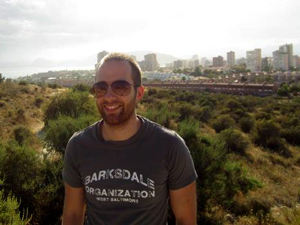
Did YOU study abroad? If so, where and what inspired you to go?
Steve: Back in 2008/09, I had the fortune to be able to spend six months in Zanzibar and six months in Lamu as part of my undergraduate degree. I was nervous beforehand as I had never travelled outside Europe, but it remains one of the best experiences I have ever had. I was able to learn so much about the coastal cultures of Tanzania, meet some wonderful people who I remain friends with to this day and, importantly for my degree, my Swahili progressed at a phenomenal rate!
What country have you always wanted to visit?
Steve: Right now I am just missing being in Tanzania, but if I had to choose somewhere that I have never been before I would have to say Rwanda. Kigali sounds like a fascinating city and the countryside looks incredibly beautiful. Everybody that I know who has been there has nothing but positive things to say about the place. It would be great to pick up some Kinyarwanda too! Outside of Africa, I would be really keen to see Japan. I read quite a lot of Japanese literature and so I think it would be really fascinating to see some of the places mentioned in the books with my own eyes.
Why is language learning and cultural immersion important to you?
Steve: While I believe that the basics of a language can be taught anywhere, cultural immersion is critical for anybody who wishes to begin to understand how language is actually used on a daily basis and how certain words and phrases are implicitly connected to the history, culture and people of that place. As a silly example, Swahili has a really impressive range of words referring to rice, which can be mindboggling to many students. However, if you actually see the different types being used and explained, understanding becomes much easier. Cultural immersion at an early stage can also help students speak much more naturally in the long term, as learning from textbooks can sometimes produce overly formal language.
How have you changed/grown since working for UoE?
Steve: The University of Edinburgh is a fantastic place to work, and I have benefitted greatly from being able to work closely with renowned and talented academics. For example, the Convener of the Swahili course in Tanzania, Thomas Molony, is one of the foremost experts on the early life of Julius Nyerere, the first president of independent Tanzania, and it was through his links that we have been able to organize the Summer School in Nyerere’s home town, Butiama, with lessons taking place in his actual office! Therefore, being able to work with people like Thomas means that opportunities open up that would never have been possible before.
What has been your favorite traveling experience?
Steve: As I mentioned before, the year I spend in Zanzibar and Lamu completely changed my life and without having had that opportunity, there is no way that I would be where I am today. I think that traveling, even for a shorter period of time, will always create new possibilities in your life that you never considered before. For example, one month in Tanzania will be more than enough to allow you to meet incredible people, learn about different ways of life and give you new perspectives on life. Whatever happens, I know from experience that the first time will rarely be the last!
What language have you always wanted to learn and why?
Steve: At the moment I am trying to learn Mandarin Chinese and Spanish, which are both goals that I have had for a long time. I would also like to learn Ukrainian, as I have family there who I have never met, and another widely spoken African language, such as Berber, Amharic or Somali. I’m still young so I feel like I have one or two languages left in me yet!
What unique qualities does your UoE possess?
Steve: The University of Edinburgh is a fantastic institution with a really wide range of resources available for its students. We are working hard to expand the Swahili materials available and before long we hope to become the go-to institution for those interested in the language. Other than that, there are so many scholars here renowned for their work in East Africa, which means that we possess a great depth of knowledge.
What is the best story you've heard from a former student?
Steve: There have been a few, but I think my favorite story is about the former student who went on Bongo Star, the Tanzanian equivalent of X Factor. I remember that his singing skills were criticized by the judges as first, but still went on to finish third! I met with him recently in Dar es Salaam, and his Swahili is now completely flawless and really natural. I think it’s a great example of how important bravery and moving outside your comfort zone can be for anyone really wanting to reach a high level, not that I am recommending that all our students go on a reality TV show!